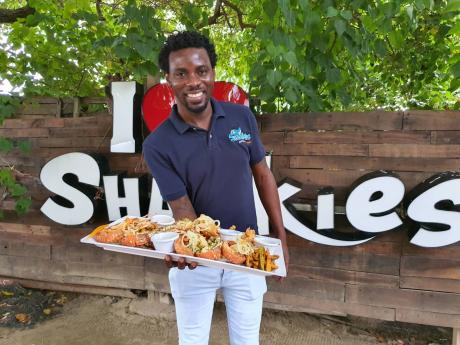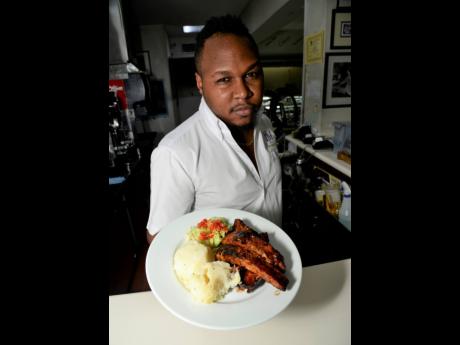Not practical – Local restaurateurs continue to make ‘ends’ meet despite restrictions
For bars and restaurant owners, the latest curfews and restrictions announced by Prime Minister Andrew Holness aren’t much of a surprise almost two years into the COVID-19 pandemic. However, instead of short-term “fixes” the restaurant industry has been ready to hear the long-term solutions having dealt with major losses, say some of Jamaica’s leading restaurateurs.
“After almost two years of this I think it’s time for us to start the return to normalcy. We will have to live with this virus until a cure is developed,” said Alwyn Brown, owner of Sharkies Seafood Restaurant in Runaway Bay, St Ann.
“Christmas is usually a busy time for restaurant as more visitors will dine out for the Yuletide season. I am sure many of my colleagues will agree when I say we have been having to compromise and find our own solutions,” he told The Sunday Gleaner.
The prime minister, on Tuesday, announced that the curfew hours will now be from 10:00 p.m. to 5:00 a.m. the following day with an extension on Christmas Eve, December 24, and for New Year’s Eve, December 31 when the curfew will commence after midnight at 1:00 a.m. He also stated that operating hours for beaches, rivers and water attractions have been extended to 5:00 p.m., instead of the current 4:00 p.m. These new measures took effect last Friday, and will end January 14, 2022.
For the Sharkies principal, “The extension for two nights only will hardly have an impact on the recovery of losses. The volume of sales that we have lost out on will need several months to years to recover from. We are part of the ENDS programme, but I wouldn’t say it improved the earnings because we still have the same expenses, but I would say that it does lessen the burden of not being able to provide for customers.”
Existing restrictions for bars and restaurants include limiting occupancy to 50 per cent of the facility’s capacity at any one time, tables must be at least six feet apart, only four persons may be seated at a table and no two tables must be joined to facilitate large groups.
“It is not practical for any restaurant operator to seat four persons at a table because it depends on the volume of customers and the number dining together. It is true that with these we have had to accommodate less customers which contributes to less revenue, but we can’t predict and don’t dictate the number of persons that will arrive in a group,” Brown said.
Nanda Dukharan, managing director of Chive Restaurant, explained that operating a business under these new normal conditions has been a whirlwind experience. With the strict restrictions and protocols disrupting existence as we know it for not one but almost two years, and counting, the restaurant has decided to weather the COVID-19 climate, come what may.
“We have accepted the situation at hand and despite the enormous challenge COVID poses to the business, [are] taking whatever measures we [can] control as a team. That means ensuring that we are all fully vaccinated and that all protocols are followed with our customers in mind,” she told The Sunday Gleaner.
The ongoing curfew not only affected the business hours, but it left a huge gap in the overall sales. Despite the hurdles, Dukharan jumped at the opportunity to make the necessary changes, and even kept her full staff on board. “During the earlier days of the COVID pandemic in 2020, it was super important to try and ensure that our staff would still be able to survive through that difficult time. We had to get creative with the schedule, reducing days as opposed to lay-offs. We placed an increased and creative effort on takeout and delivery to make up for a dramatic decrease in revenue. I can say that currently we have a full staff on hand,” she said proudly.
Championing through the heat of the pandemic also meant taking alternative approaches to business: opening earlier than usual to accommodate diners during the scheduled time and participating in the Government’s delivery programme, designed to connect consumers with companies during curfew hours.
“ENDS assisted in the initial stages when the curfew hours were much [more] limited. With the increased hours to dine in or takeout now in place, that impact has somewhat been reduced,” she added. Since an even greater extension of hours have been allocated during the holiday season, Dukharan is looking forward to seeing a big difference in the dining numbers. These added hours will give our customers more time to get their busy holiday activities out of the way and more time to dine with us,” she said.
Careem Mullings, co-owner of 876 Terrace Bar and Grill, doesn’t agree with that sentiment. According to the restaurateur, closing off before midnight will always stand as a loss in his book, since he operates an evening to night business. And the two nights that are scheduled to extend up to 1 a.m. (Christmas Eve and New Year’s Eve) is an effort but just not enough to make up for the other 363 days of the year.
“What the Government fails to understand is that even though they make these changes, conglomerates like landowners and utility outlets such as Jamaica Public Service aren’t giving any leeway or breaks. The banks, although providing some leeway, still expect their payments in full. Whatever debt you have, even government debt, you still have to meet those obligations,” he shared.
It continues to be exceedingly difficult to cope with the new measures. But he could recall the time when there was no movement on Sundays and a 6 p.m. curfew implemented for the other days of the week being the absolute worst. He found the responsibilities increasingly onerous, taking a huge pay cut in order to keep full staffing. “We value our human resources so we did our best to keep things the same. We have not reduced the staff’s per day salary. Even though they’re working less hours, the salary remains the same.” While he understands the cause and benefit of limited seating indoors, Mullings maintains that the protocols did hurt his business’ bottom line.
MAKING ENDS MEET
“We never signed up for ENDS because we provide a dining experience like no other. ENDS is for takeout and I cater to large groups for dining. My business model and menu weren’t designed for that. I applaud them for trying, but that’s really for fast food chains,” he said. Mullings believes that the midnight curfew should have been the way to go for restaurants, keeping the other regulations of no parties and small gatherings in place, “This would have given the day businesses their full 12 hours and the evening to night businesses their full eight hours of operations; that would have been a fair approach to make.”
Meanwhile in Portmore restaurants have been dealing with strict protocols pre-COVID pointed out Philip Edwards, marketing manager at EndzZone Sports Bar and Grill.
“Months before the pandemic hit Jamaica, St Catherine and Clarendon had been locked down when the prime minister declared a state of emergency (SOE), so our restaurant has been having to deal with protocols. It is a never ending story. We have lost significant staff – very valuable members – from the supervisory level as well, persons have had to move on to make ends meet,” Edwards said.
“We can only do our best to try to follow the protocols but at a time where persons are celebrating, even for us as a sports bar, where customers come to celebrate birthdays having four persons at a table does not work. Because people cannot have parties, they opt to have a dinner, but then you can’t join the tables it’s like it doesn’t give you an opportunity to have the business. If we advertise these experience but can’t provide people just won’t bother to reach out. Yes, we are part of ENDS but how long can I open my kitchen for an a la carte menu. Also, remember people come to sports bars for more than food and drinks, it’s the experience and buying into the ambiance,” he continued.


